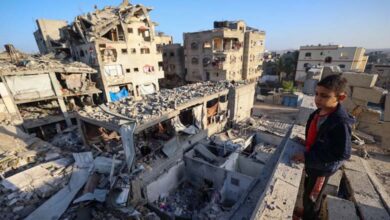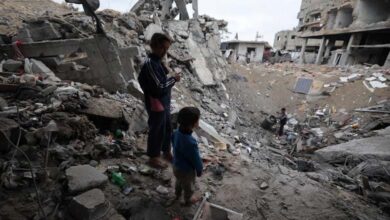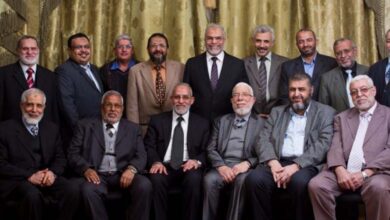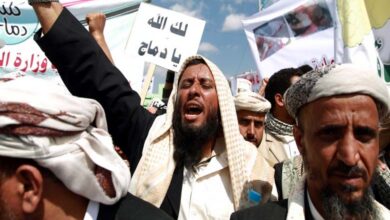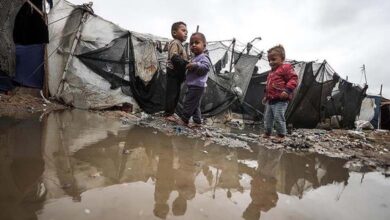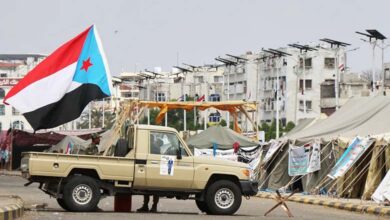Washington targets militia sites in Iraq despite Sudanese warnings
Lloyd Austin confirms that the attacks are a response to the escalation by Iran's allies, while militia leaders emphasize the continued shelling of American bases in Iraq and Syria until the end of the war on Gaza
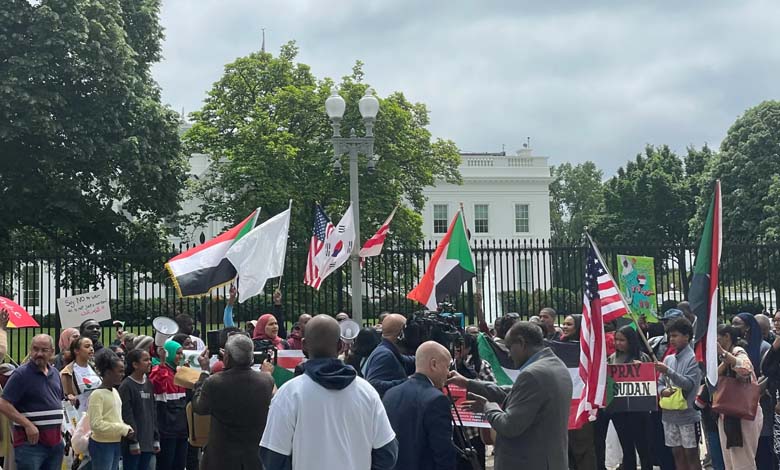
The United States carried out strikes in Iraq against three facilities linked to factions allied with Iran on Tuesday, following an attack earlier in the week on an Iraqi airbase that resulted in injuries to American soldiers, according to the U.S. Department of Defense (Pentagon), while Iraqi officials expressed their rejection of these operations.
U.S. forces in Iraq and Syria have faced approximately 150 attacks from Iran-aligned militants since the start of the conflict between Israel and Gaza in October, putting pressure on President Joe Biden to respond militarily despite political sensitivities in Baghdad.
Four American soldiers suffered concussions on Saturday after the Ain al-Asad Air Base in Iraq was hit by ballistic missiles and rockets launched by militants aligned with Iran from within Iraq. U.S. Defense Secretary Lloyd Austin said in a statement, “U.S. military forces conducted necessary and proportionate strikes on three facilities used by militias affiliated with Iran, including the Hezbollah Brigades and other Iranian-backed groups in Iraq.” Austin added, “These precise strikes are a direct response to a series of escalating attacks against American soldiers and coalition forces in Iraq and Syria by militias sponsored by Iran.”
The U.S. Central Command, which conducts operations in the Middle East, stated that the strikes targeted “headquarters, storage facilities, missile and artillery training sites,” and capabilities related to drone aircraft for Hezbollah Brigades. In Iraq, a medical source and an armed group source said that U.S. strikes killed at least two militants and injured four others.
The military spokesperson for the Hezbollah Brigades, Jaafar al-Husseini, said in a post on X that the group will continue to target “enemy strongholds” until the end of the Israeli siege on Gaza, specifically mentioning U.S. support for the Israeli campaign.
Iraqi National Security Advisor Qasim al-Araji stated on his Twitter account, “Targeting the Hashd bases in Al-Qa’im and Jurf Sakhar is an outright assault and a blatant violation of Iraqi sovereignty. It does not help in calming tensions. On the U.S. side, pressure should be exerted to stop the ongoing aggression on Gaza, instead of targeting and bombing Iraqi national institutions.”
In response, Brigadier General Yahya Rasoul Abdullah, spokesperson for the Commander-in-Chief of the Armed Forces, said on Wednesday that the U.S. military attacks are “aggressive acts,” emphasizing in a statement that “with a clear determination to harm security and stability in Iraq, the United States has returned to carry out airstrikes against military units of the Iraqi army and Popular Mobilization Forces, in the areas of Jurf al-Nasr and al-Qa’im.”
He stated that “at a time when agreements about the role and tasks of the International Coalition forces and its advisers in Iraq have been cut positively on the path to organizing the future relationship, we find these actions committed to obstructing this path and undermining all agreements and axes of joint security cooperation.”
He emphasized that “this rejected act undermines years of cooperation and blatantly violates Iraq’s sovereignty, leading to a clear escalation at a time when the region is at risk of expanding the conflict and the repercussions of the aggression on Gaza and the results of the unethical genocide facing the Palestinian people.”
He added, “While the major powers, including the United States, remained silent about these crimes, we see them slipping into condemned and unjustified aggressive actions on Iraqi national territory and sovereignty.”
The attacks against the United States are considered retaliation for its support for Israel in its war against the Palestinian Hamas movement, allied with Iran. The scope of the war in Gaza has widened as U.S. forces strike Houthi targets, who are carrying out attacks on ships in the Red Sea. The United States has 900 soldiers in Syria and 2,500 soldiers in Iraq, providing advice and assistance to local forces to prevent the resurgence of the Islamic State, which seized large areas of both countries in 2014 before its defeat.
The office of Iraqi Prime Minister Mohammed Shia Al-Sudani announced steps to remove U.S. forces after a U.S. drone strike in Baghdad earlier this month, condemned by the government. The Pentagon stated that the strike resulted in the killing of a militia leader responsible for recent attacks on Americans.
The Pentagon said the strike resulted in the death of a militia leader responsible for recent attacks on Americans. Al-Sudani’s control is limited over some factions allied with Iran, which he needed support from to win power a year ago and now form a strong bloc in his ruling coalition. The Pentagon stated that it has not been officially notified of any plans to end the presence of U.S. forces in the country, saying its forces are deployed in Iraq at the request of the government in Baghdad.
Following the U.S. strike, Abu Alaa al-Walai, a commander of an armed group sanctioned by the United States last year for involvement in attacks on U.S. forces, said that Iraqi armed groups allied with Iran under the banner of the Islamic Resistance in Iraq must expand their operations by “imposing a blockade on Zionist maritime navigation in the Mediterranean Sea.”



